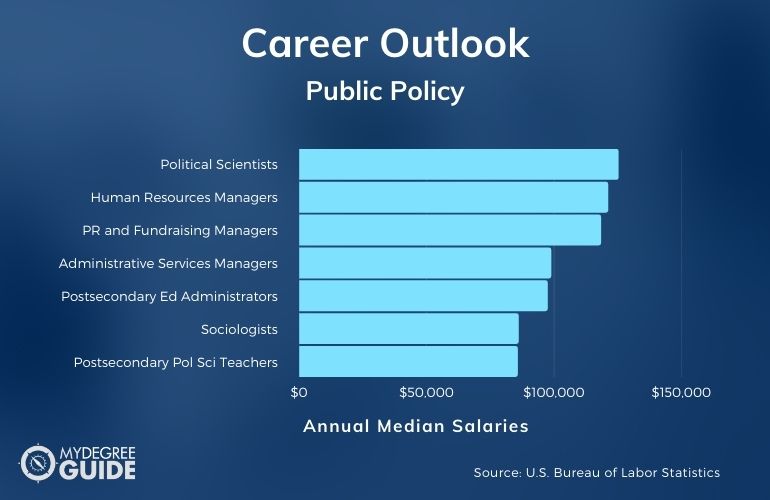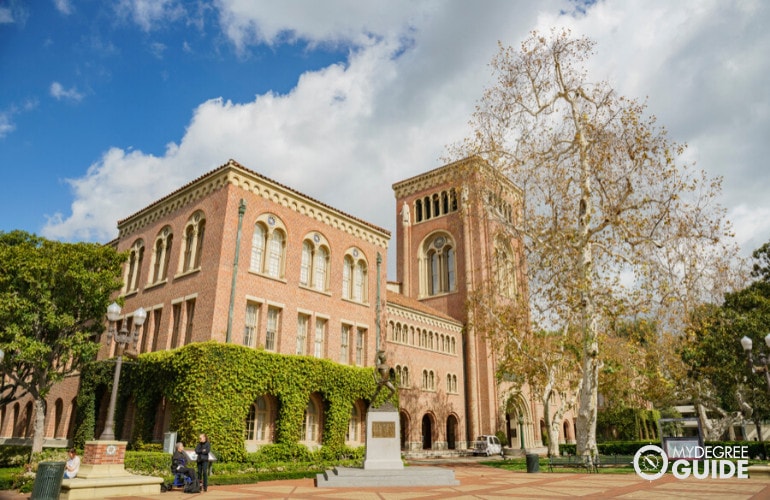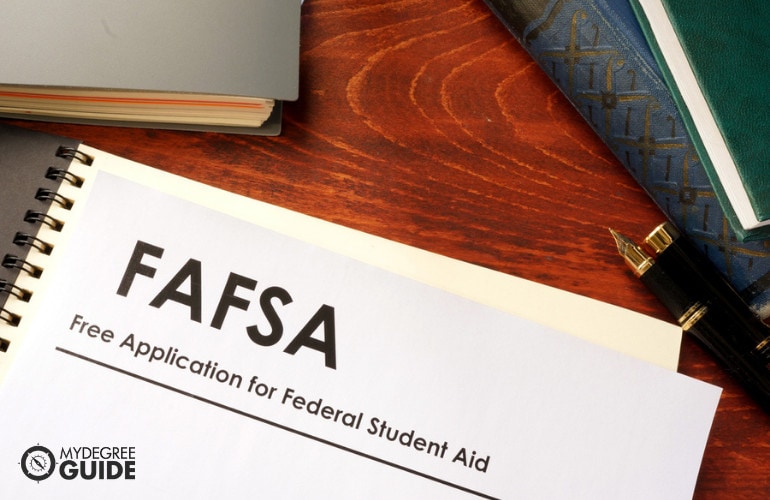If you’re interested in high-level policy work, you may consider earning a PhD in Public Policy online.

A public policy doctoral program may not only teach you the necessary skills for the field but also qualify you for employment within universities, government agencies, and research organizations.
Editorial Listing ShortCode:
You may even earn your online public policy degree with self-paced or part-time courses that fit within your busy schedule.
Universities Offering Online PhD in Public Policy Degree Programs
Methodology: The following school list is in alphabetical order. To be included, a college or university must be regionally accredited and offer degree programs online or in a hybrid format.
Liberty University
The public policy doctorate program at Liberty University consists of 60 credits. It offers specialties in social policy, education policy, economic policy, foreign policy, and more. The program usually takes 3 years to complete, and classes are available 100% online.
Liberty University is accredited by the Southern Association of Colleges and Schools Commission on Colleges.
Old Dominion University
Old Dominion University offers a PhD in Public Administration and Policy. Students can learn how to design research studies, conduct policy evaluations, build multi-sector programs, and even teach postsecondary classes in policy.
The program requires 49 credits to graduate, with 37 credits being coursework and 12 credits being dissertation related.
Old Dominion University is accredited by the Southern Association of Colleges and Schools Commission on Colleges.
Saybrook University
Rather than offering a public policy degree, Saybrook University has a transformative social change degree. It covers many of the same topics, including advocacy, public relations, and social program development, but it has a stronger emphasis on reform and research.
Classes are available online with a 5 day, in-person conference at the beginning of the semester.
Saybrook University is accredited by the Senior Commission of Western Association of Schools and Colleges.
Union Institute and University
The public policy program at Union Institute and University is divided into two 6 month terms, and classes are a hybrid blend of online and in-person.
There are two residency periods in winter and summer to get hands-on experience with policy, reform, leadership, and administration. The program requires 66 credits and can be completed in as little as 3 years.
Union Institute and University is accredited by the Higher Learning Commission.
Walden University
Walden University offers a PhD in Public Policy and Administration. The school operates on a quarter credit system, and there are several tracks that you can choose from, depending on whether you’re more interested in coursework, projects, or residencies. Some elements of the program are online while others are in person.
Walden is accredited by The Higher Learning Commission.
Online Ph.D. in Public Policy Programs

An online doctorate in public policy is the highest qualification that you can obtain in the field. As such, you may encounter rigorous coursework in subjects like business, economics, civics, ethics, and public administration.
A lot of your curriculum will typically depend on your specialization. If you’re focusing on welfare reform, for example, your schedule might look very different from someone who is studying education or international politics.
Most schools require the completion of a dissertation in order to graduate with a PhD. Some might let you complete a capstone project or a certain number of fieldwork hours instead. Additionally, schools might have opportunities for internships and fellowships within public policy agencies and other relevant organizations.
After you graduate, you may pursue many different career paths, including legislator, policy analyst, political scientist, university professor, and health services manager. The direction of your career will often depend on what you studied in school and what you’re qualified to do.
The good news is that public policy is a growing field. More and more people are being hired to work in nonprofits, social service agencies, government offices, and international think tanks, among others.
While a public policy PhD isn’t a guarantee of a good job, it may help you stand out from other applicants in competitive fields. It may also provide you with the educational foundation that can help you thrive in a high-level position.
Public Policy Careers

According to the Bureau of Labor Statistics, the average salary for management positions is $109,760 per year. They don’t track public policy jobs specifically, but a PhD will often qualify you for managerial positions.
The following are a few careers in this field that you might consider:
| Careers | Annual Median Salaries |
| Political Scientists | $125,350 |
| Human Resources Managers | $121,220 |
| Public Relations and Fundraising Managers | $118,430 |
| Administrative Services Managers | $98,890 |
| Postsecondary Education Administrators | $97,500 |
| Sociologists | $86,110 |
| Postsecondary Political Science Teachers | $85,760 |
| Urban and Regional Planners | $75,950 |
| Social and Community Service Managers | $69,600 |
| Market Research Analysts | $65,810 |
These jobs range from university positions to ones within government agencies, private businesses, and even community service groups. A public policy degree can be very versatile.
Public Policy Doctoral Curriculum

Most public policy degree programs are divided into core classes and electives. The core classes will likely cover things like quantitative research methods. The electives are broader and more wide-ranging to account for different specializations, such as finance, economics, health policy, environmental policy, or international business.
You might find the following courses in a public policy doctoral program.
- Evaluating Public Policies and Programs: This is a basic, introductory-level course that will teach you how to perform evaluations and apply standard research methods to tasks and studies.
- Finance: Even if you aren’t specializing in it, it can be helpful to familiarize yourself with budgeting, accounting, and fundraising for public policy work.
- Ethics in Public Policy: Usually required as a core class, this is an ethics course with an emphasis on the challenges and moral debates surrounding both classic and contemporary issues in public policy.
- Leadership: Though they’re not exclusive to public policy programs, leadership courses can be useful for future managers and supervisors of all types. They’ll cover things like communication, delegation, organizational behavior, and strategic decision making.
- Policy Analysis: An analysis course will teach you how to approach and understand policy research and development through readings, data collections, discussion boards, collaborative projects, and more.
- Global Affairs: These classes can cover everything from foreign policy study to diversity and sensitivity training for future overseas workers.
- Economics: Economics is another subject that’s frequently considered essential for public policy students. You might be required to take microeconomics, macroeconomics, or statistical methods in economics.
- Public or Business Administration: These classes will cover the administrative side of things, like policy development and research.
- Special Topics in Public Policy: Since the field of public policy is ever-changing, it’s common to find “special topics” courses that cover current, real-world issues in the field.
- Dissertation: Your dissertation will often be the culmination of your degree, and it usually requires several semesters’ worth of drafting, writing, editing, and researching. Some schools will even have a mandatory credit requirement for dissertation preparation.
If you’re going for a PhD in Public Policy online, you may want to speak with an advisor about the face-to-face requirements of your degree. Even an online program might require in-person fieldwork with a nonprofit, government office, or social service agency.
Admissions

There can be various admission requirements for a public policy PhD program, so it’s often worth looking into the specifics of your chosen school to make sure that you meet their criteria. Generally speaking, the requirements will look a little something like this:
- Test scores. While a growing number of schools are experimenting with “test optional” admission models, PhD programs may still request GMAT or GRE scores.
- Transcripts. Some grad schools will require both a bachelor’s and master’s degree for admission. Others will only require a bachelor’s degree.
- Application. In addition to personal and financial data, a typical PhD application involves a resume or CV, letters of recommendation, and a statement of purpose or intent.
Sometimes it can take weeks or even months to gather all of the necessary documents, submit an application, arrange for financial aid, and work out the minutiae of your schedule. Instead of waiting until the last minute to apply, you might want to give yourself plenty of time to figure things out.
Accreditation

As a prospective PhD student, you may already be familiar with accreditation and why it’s important, but it bears repeating. It’s beneficial to check the website of the U.S. Department of Education for accredited schools when looking at public policy doctoral programs.
High-level universities and government agencies are generally only going to recognize a PhD from an accredited school. Additionally, many loan and scholarship organizations require you to attend an accredited school to qualify for financial aid.
Financial Aid

Financial aid for PhD students is a little different than financial aid for undergrads. While you’ll still qualify for certain parts of the Free Application for Federal Student Aid (FAFSA), including the Direct PLUS Loan for Graduate and Professional Studies, aid like the Pell Grant will no longer apply.
Instead, you may want to look at fellowships, scholarships, and assistantships that are meant specifically for PhD students. You can also see if you qualify for fully-funded or partially-funded PhD programs that may pay you a stipend in addition to covering costs of tuition and textbooks.
In addition to seeing what’s available to you as a public policy student, you can also check out financial aid for business administration and political science students. There’s often a lot of overlap in these fields, so you might find scholarships that are open to anyone within politics, economics, policy, and law (PEPL).
What Can You Do with a Ph.D. in Public Policy?
A public policy degree can help prepare you for a number of different careers. If you’re interested in politics, for example, you might pursue a career as a legislator, political scientist, policy analyst, or government program director.
If you want to make the world a better place, you might focus on education, public health, or social services work as an administrative manager. You might study or teach at universities as a researcher or professor. You may even become a fundraiser for your favorite charitable cause.
How Long Does It Take to Get a PhD in Public Policy?

It may take anywhere from 3 years to 5 years to earn a Doctor of Philosophy (Ph.D.) in Public Policy. It depends, though, on the required number of credits from your degree program and whether you’re studying full-time or part-time.
If you’re enrolled in a hybrid or online program that allows for extra flexibility with your classes, the trade-off might be a longer graduation time than if you’d studied on a more traditional schedule.
What Is the Difference Between Public Policy vs. Political Science?
As a subject, political science is closely related to public policy, but it’s not quite the same. Political science takes a broad, sweeping look at politics as a whole. On the other hand, public policy has a narrower, more specialized focus on public organizations and their policies and procedures.
This isn’t to say that public policy is a small field. On the contrary, it may lead to many different jobs in schools, charities, courtrooms, law firms, government agencies, and social service offices. It’s just focused exclusively on the policy work of such institutions.
What’s the Difference Between a PhD in Public Policy vs. Public Administration?

Public administration is another field with a lot of crossover into public policy. Again, the difference lies in the focus areas of the two disciplines.
Public policy is dedicated to policy: researching it, analyzing it, creating it, and reviewing it. Public administration, on the other hand, can involve policy work in addition to many other skills and subjects.
Is a Ph.D. in Public Policy Worth It?

Yes, a public policy PhD is worth it for many students. The Bureau of Labor Statistics is projecting 5% job growth in management-level positions over the next 10 years. Common public policy careers include policy analyst, political scientist, administration manager, nonprofit director, and public relations specialist.
Maybe you’re a long-time student of public policy. Maybe you already have a background in political science or business administration, but you’re looking to specialize your focus area or qualify for higher-paying jobs within your industry.
Either way, a PhD in Public Policy may be a strategic investment for the future, and the existence of accredited online degree programs may make it more convenient for you to earn this terminal degree.
